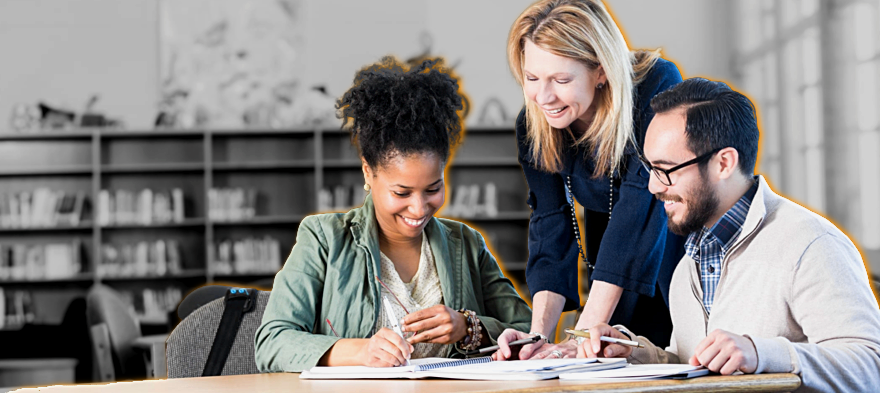
Nov 17, 2021 12:00:00 AM
Trust is the centerpiece of any relationship and has played a critical role in our lives in the grueling year we just experienced as educators. On the first day of school this year, I met with worried parents overwhelmed in fear of their families catching this horrendous virus. I needed to reassure, show and explain how I was willing to go above and beyond to keep their children safe. I was committed to clear communication before that day and continued to be committed to it afterward. The natural way to build trust with the families of my students during this difficult time was an extension of the trust that had been built in previous experiences with fellow teachers, students, and administrators.
When you are not in the "Trust Zone," chaos undermines school functioning resulting in a lack of action on initiatives and/or divisiveness that leads to a sense of not belonging. [pullquote]The more high-quality relationships students have with adults, the better their engagement, belonging, and ultimately, their learning.[/pullquote] Like gas for your car, trust is the energy needed to move both educators and students forward.
With colleagues, trust means being valued and respected. Trust is present when teachers have open, collegial conversations and offer a supportive ear with an honest perspective. Teachers must be encouraged to make and reflect on mistakes when trying new ideas. “In schools where the professional community is strong, teachers work together more effectively and put more effort into creating and sustaining opportunities for student learning.” I am grateful for grade-level colleagues who will help with strategies to better differentiate for my students. They are also by my side to celebrate when things improve or are going well.
Additionally, administrators must trust teachers to be able to consider the students’ best interests when making decisions. Administrators must believe that their teachers are teaching appropriate content that will benefit the students and walking into a classroom to support teachers or greet students. A classroom visit outside of evaluation periods is a great way to simply interact with students when there is a strong relationship between the teacher and administrator.
Similarly, having faith in one another plays a vital role in student-teacher success. A teacher must be willing to let go of control to establish a student-centered classroom based on relationships. When educators give students the power of confidence, they are relaxed and safe in your classroom. [pullquote]Emotional security contributes significantly to student success in your classroom, both academically and socially.[/pullquote] When students are welcome to ask for help when struggling with an assignment, they feel supported. If a student is being bullied, they need to know the school will take action to create safety. This is yet another pathway to being in the Trust Zone.
If you would like to build trust, consider starting here:
As a beginning teacher many years ago, I would shake in fear and nervousness when my principal would walk into my classroom. I didn’t trust him to see all the excellent work I was doing as he was unable to see the hours of designing, analysis, and nuanced interactions that went into a 20-minute formal observation; I also didn’t trust him to help me in overwhelming moments of stress.
Until one day as we were going over data, my principal let me know how he valued me, and every time he entered my classroom, he saw how excited and engaged my students were in the lesson. He showered me with gratitude and compliments. Most importantly, he saw my efforts, listened, and let me know that he was there to help me. He reassured me that we are a team and no one is alone. This trusting environment is a place where educators, students, and families can thrive and it’s a place where I want to be.
Jessica Barbera is currently a second grade teacher. Prior to moving to Hawaiʻi Island, Jessica taught kindergarten in Honolulu. This summer she collaborated with teachers from different islands to team-teach "Mad Scientists", a PreK through first grade class in the innovative Virtual Summer Learning Lab. Jessica is passionate about learning from and collaborating with her students, parents, colleagues and members of the community in order to become a better, more effective teacher. She is especially proud of her participation in the Lemon Tree Project & Kindergarten Greenhouse at Jefferson Elementary, as well as her work with introducing new technology to her students and families. Jessica earned a bachelor's degree in elementary education from Hawaii Pacific University.
The story you tell yourself about your own math ability tends to become true. This isn’t some Oprah aphorism about attracting what you want from the universe. Well, I guess it kind of is, but...
If you have a child with disabilities, you’re not alone: According to the latest data, over 7 million American schoolchildren — 14% of all students ages 3-21 — are classified as eligible for special...
The fight for educational equity has never been just about schools. The real North Star for this work is providing opportunities for each child to thrive into adulthood. This means that our advocacy...
Your donations support the voices who challenge decision makers to provide the learning opportunities all children need to thrive.
Ed Post is the flagship website platform of brightbeam, a 501(c3) network of education activists and influencers demanding a better education and a brighter future for every child.
© 2020–2024 brightbeam. All rights reserved.
Leave a Comment